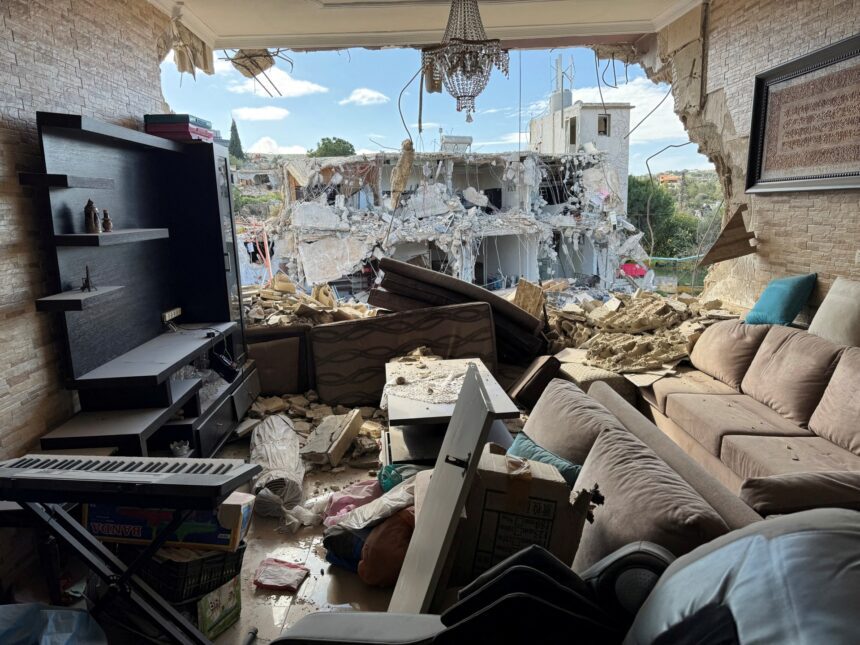Following the initial terms of the agreement that brought about a ceasefire between Israel and the Lebanese group Hezbollah in November, Israel was supposed to remove its forces from southern Lebanon by January 26.
Despite the passing of this deadline, Israel has chosen not to withdraw its military, and the deadline has been extended to February 18. Israel has also continued to intermittently bombard areas in Lebanon – leading to strong condemnations from the Lebanese side – alleging that it is targeting Hezbollah for violating the ceasefire.
The presence of Israeli troops in southern Lebanon has prevented thousands of people from returning to their homes in border villages, with Israeli soldiers firing at individuals who come too close.
The conflict between Israel and Hezbollah – a Shia group that is the most powerful military force in Lebanon – started on October 8, as Hezbollah launched attacks in support of the Palestinian group Hamas in Gaza, which was facing Israeli aggression. Israel escalated its attacks on Lebanon in September and assassinated Hezbollah leader Hassan Nasrallah on September 27.
Israel has caused the deaths of approximately 4,000 individuals throughout Lebanon since October 2023.
Why is Israel still occupying southern Lebanon? How can this be considered a “ceasefire”? And what exactly is Israel’s ultimate goal?
Here is all the essential information you need.
Did the ‘ceasefire’ end the conflict?
While Hezbollah has ceased its attacks, Israel has not done the same.
Israel’s airstrikes are not as frequent as before the ceasefire on November 27, and nightly bombings of Beirut’s southern suburbs have ceased.
However, Israel continues to carry out occasional attacks, some of which occur north of the Litani River – where Hezbollah is required to move its forces as per the ceasefire agreement.
The Armed Conflict Location & Event Data Project (ACLED), a group that collects data, has documented 330 air strike and shelling incidents conducted by Israel between November 27 and January 10, along with 260 instances of property destruction.
What about Hezbollah?
Israel alleges that Hezbollah has also failed to comply with the terms of the ceasefire.
Israel’s Defence Minister Israel Katz stated that Hezbollah has not withdrawn north of the Litani River, situated in southern Lebanon.
“If this condition is not met, there will be no agreement and Israel will need to act independently to ensure the safe return of residents of the north to their homes,” said Katz in January.
Hezbollah’s Secretary General Naim Qassem mentioned in a speech at the end of January that Hezbollah had followed the ceasefire agreement but did not specifically mention whether the group had completely withdrawn from the south.
ACLED has reported one attack carried out by Hezbollah since the ceasefire began.
“Hezbollah has largely refrained from violence – there have been no direct attacks on Israeli territory since the ceasefire took effect, with the exception of a single attack on December 2 against the Israeli Rwayset Al Alam site in the occupied territories that we categorize as Syria,” explained ACLED’s Ameneh Mehvar to Al Jazeera.
Qassem stated that the group would remain patient despite the repeated attacks against it.

What has the global response been?
Lebanon has submitted a complaint to the United Nations against Israel for breaching the ceasefire.
French President Emmanuel Macron urged Israel to meet the initial ceasefire deadline for withdrawing its troops, with limited impact. France and the United States were the original mediators of the agreement.

Are there consequences for violations?
Diplomatic sources indicated that the US – a staunch ally of Israel – gave assurances that the agreement would be upheld.
However, there were no other consequences – and no suggested penalties – in case the ceasefire was violated.
Israel has not faced any repercussions for its repeated breaches of the ceasefire or for extending the ceasefire period until February 18.
What occurs if Israel refuses to vacate Lebanon?
The outcome is uncertain.
In a speech in January, Hezbollah’s Qassem implied that his group’s patience could wear thin with Israel’s violations. However, in a more recent speech, he seemed to shift the responsibility to confront Israel to the Lebanese state.
“The Lebanese state bears full responsibility for monitoring, pressuring, and attempting to prevent, through mediators and international pressure, these violations and this Israeli aggression,” stated Qassem in a televised address last week.
The Lebanese army is slated to enter southern Lebanon as part of the ceasefire agreement.
Any response from Hezbollah will be limited due to the weakened position it currently finds itself in. The collapse of President Bashar al-Assad’s regime in Syria has cut off Hezbollah’s land route to receive weapons from its primary supporter, Iran.
Furthermore, its military capabilities suffered significant losses during the two-month escalation from September to November, when Israel invaded Lebanon. Additionally, it has lost most of its top military leadership.
For these reasons, Hezbollah appears hesitant to take any action that might give Israel a reason to increase its attacks.









